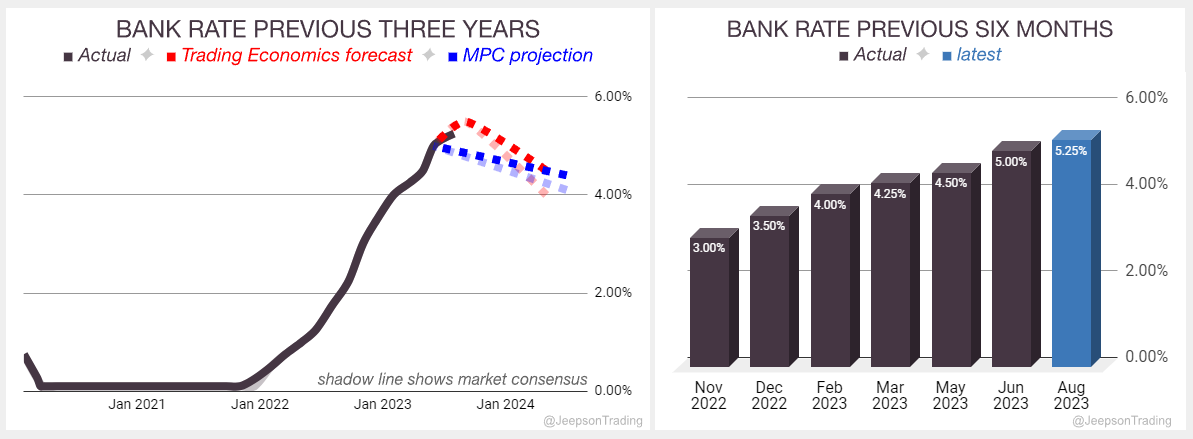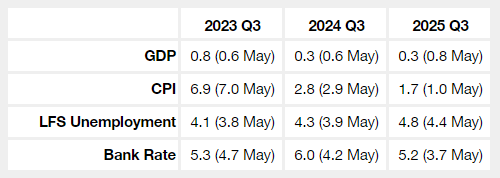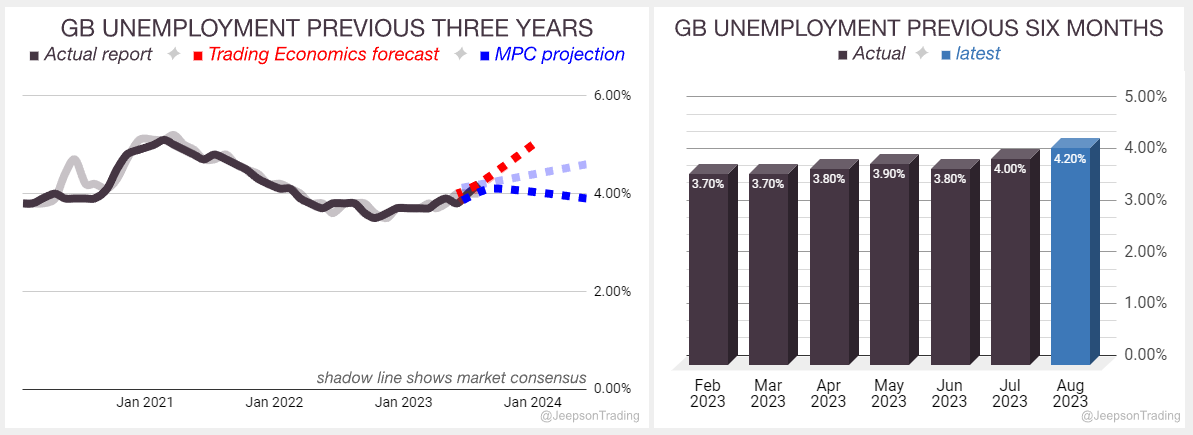Pound Sterling Forex Factbook AUGUST
INTENDED USE: Factual data that can be studied to aid your analysis of the Pound Sterling.
DERBYSHIRE GB / AUGUST 22nd, 2023 - Updated with August reports Next update after the Labour report on Tuesday, September 12th, or before if any significant event occurs.
ABOUT
The pound sterling, or GBP, is the official currency of the United Kingdom. It is the oldest currency in continuous use and is the fourth most traded currency in the world.
MONETARY POLICY
The Bank of England
The Bank of England is the Central Bank of the United Kingdom and monetary policy decisions are made by the nine members of the Monetary Policy Committee (MPC).
The August meeting matched expectations with a 0.25% hike of the Bank Rate setting it at 5.25% which is up from 5.00% and the 0.50% hike in June.
The latest rate is just below the Trading Economics Q3 ‘23 forecast of 5.50% which they also identify as the peak.
Over the previous three years, since the start of 2020, the interest rate has been trending up with a low of 0.10% and a high of 5.25%. Over the previous six months, the rate has continued to climb.
The next meeting is due on Thursday, September 21st.
The Monetary Policy Committee’s statement August statement summarised:
Voted to increase Bank Rate by 0.25 percentage points, to 5.25%.
The decision was made by a majority of 6-3, with two members preferring to increase Bank Rate by 0.5 percentage points, to 5.5%, and one member preferring to maintain Bank Rate at 5%.
The MPC's decision was based on the following factors:
Inflation remains well above the 2% target, at 7.9% in June.
Wage growth is strong, at 7.7% in the three months to May.
The labour market is tight, with the unemployment rate at 4.0%.
The MPC expects inflation to fall to around 5% by the end of the year, but to remain above the target in the medium term.
The MPC is concerned about the risk of more persistent inflationary pressures, and is therefore taking a cautious approach to monetary policy.
Sources: The Bank of England, Trading Economics, FXStreet
August 2023 Monetary Policy Report
The Bank of England's Monetary Policy Committee (MPC) revised its economic forecast for the UK at their August meeting. They will update them again in November.
Increased the Bank Rate by 0.25 percentage points, to 5.25%
Concerned that inflation could become more persistent
Inflation remains too high
Wage growth is strong, pressuring inflation
Labour market is tight, pressuring inflation
ECONOMIC DATA
Gross Domestic Product (GDP)
Measures the quarter on quarter change of the inflation-adjusted value of produced goods and services.
Preliminary Q2 ‘23 estimate came in higher than expected at 0.2% expansion and up from 0.1% expansion in Q1 ‘23.
The latest report is far below the MPC 2023 Q3 Real GDP forecast of 0.8% (revised up from 0.6%) and slightly above the Trading Economics Q3 ‘23 forecast of 0.1%.
Over the previous three years, since the start of 2020, GDP has been trending up with a low of -19.5% and a high of 16.9%. Over the previous six months, GDP has been steady with a very slight improvement.
The final Q2 report is due on Friday, September 29th.
Sources: Office for National Statistics, Trading Economics, FXStreet
Consumer Price Index (CPI)
Measures the yearly change in the price of goods and services purchased by consumers.
July matched expectations coming in at 6.8% inflation and hugely down from 7.9% in June.
The latest report is now just below the MPC Q3 2023 CPI forecast of 6.9% although Trading Economics are far more optimistic with a Q3 ‘23 forecast of 5.8%.
Over the previous three years, since the start of 2020, CPI has been trending up with a low of 0.2% and a high of 11.1%. Over the previous six months, CPI has been falling quickly.
The August report is published on Wednesday, September 20th.
Sources: Office for National Statistics, Trading Economics, FXStreet
Labour
Unemployment rate measures the number of people actively looking for a job as a percentage of the labour force.
June ‘23 report came in higher than expectations at 4.2% which is higher than 4.0% in May ‘23.
The latest report is now just above the MPC Q3 2023 LFS Unemployment forecast of 4.1% but matches the Trading Economics Q3 ‘23 forecast of 4.2%.
Over the previous three years, since the start of 2020, Unemployment has been trending down with a high of 5.2% and a low of 3.5%. Over the previous six months, unemployment has been rising.
The July report is due on Tuesday, September 12th.
Sources: Office for National Statistics, Trading Economics, FXStreet
MARKET NARRATIVES
Cost-of-Living Crisis
The cost-of-living crisis has reduced the spending power of consumers and resulted in slower economic growth. This is likely to lead to reduced foreign investment in the stock market and is expected to apply downward pressure on the pound’s value.
Since late 2021, the prices of essential goods have been rising faster than incomes. This has caused a fall in real income which means people now have less money to buy the things they need.
There are a number of factors that have contributed to this rise in prices, including inflation, the COVID-19 pandemic, Russia's invasion of Ukraine, and Brexit.
2023: Strikes continue and further sectors join in such as education.
2022: Government assistance provided with energy bill cap and a minimum wage increase fails to solve the crisis and employees strike from several sectors such as transport, health and services. Some strikes are resolved but the majority are ongoing.
GEOPOLITICAL EVENTS
Russian Invasion of Ukraine
The war is having a detrimental effect on the global and UK economy by causing higher energy prices, supply chain disruptions, financial market volatility, refugee crisis and geopolitical uncertainty.
2021: 92,000 Russian troops are amassed at the Ukraine border and President Putin proposes a prohibition of Ukraine joining NATO which is rejected.
2022: On the 21st of February, President Putin ordered Russian forces to enter the separatist republics in eastern Ukraine and announced recognition of the two pro-Russian breakaway regions (Donetsk People's Republic and Luhansk People's Republic). NATO applied sanctions and scaled them up as the war progressed. Ukraine mounted a counter-offensive which regained lost territory and as winter arrived, a stalemate began.
2023: Russian began a new offensive in January although gained little ground. In early June, Ukraine began its counteroffensive although progress has been slow even as Russia faced mutiny from the short-lived Wagner rebellion. During late August, Denmark announced the supply of nineteen F-16 fighter jets to Ukraine with the first batch of six arriving this year.
Brexit
The UK's decision to leave the European Union (EU) has created a great deal of uncertainty about the future of the UK economy. This uncertainty has made investors less willing to take risks, which has led to a sell-off in risky assets, such as stocks and currencies.
2014-2015: The euro-sceptic party UKIP garners support and scores the most seats in the EU parliament election. The Conservatives win the 2015 general election and as promised in the manifesto, PM Cameron arranges a referendum on the UK's membership of the EU.
2016: On the 23rd of June, 52% voted for the UK to leave the EU. PM Cameron who is pro-EU resigns and Theresa May takes the helm. In October, Article 50 is triggered and the two-year process of the UK's withdrawal from the EU begins.
2017-2018: PM May calls a snap general election and loses the majority but retains power by sharing with the Democratic Unionist Party (DUP). Withdrawal agreements fail to pass parliament, an extension is made but further revisions to the agreement continue to be rejected by parliament.
2019: PM May resigns and Boris Johnson takes power who gains another extension from the EU to enable further negotiations. The deadline is now the 31st of January, 2020. Another general election is called and the Conservatives regain the majority.
2020: With negotiations strained and the deadline having passed, the UK is forced to leave the EU without a deal. Negotiations continue and a deal is eventually agreed which comes into effect on the 1st of January 2021. The EU-UK Trade and Cooperation Agreement (TCA) is a comprehensive trade deal that covers goods, services, fisheries, and much more.
Gavin Pearson
Retail trader since 2008
Specialises in forex G7 currencies
Funded account from the5ers.com
Member of the eToro Popular Investors Program
Regular contributor to FXStreet.com analysis and education pages
Jeepson Trading Fund
Returned 27% in 2022 and 5.8% in 2023 H1
Forex focused
Copy Trading available at eToro
eToro
eToro is a social trading platform
Users can copy trades by clicking the "Copy" button on the profile page
Disclaimer
Past performance is not indicative of future results
Trading involves risk, and you could lose money
-end-







